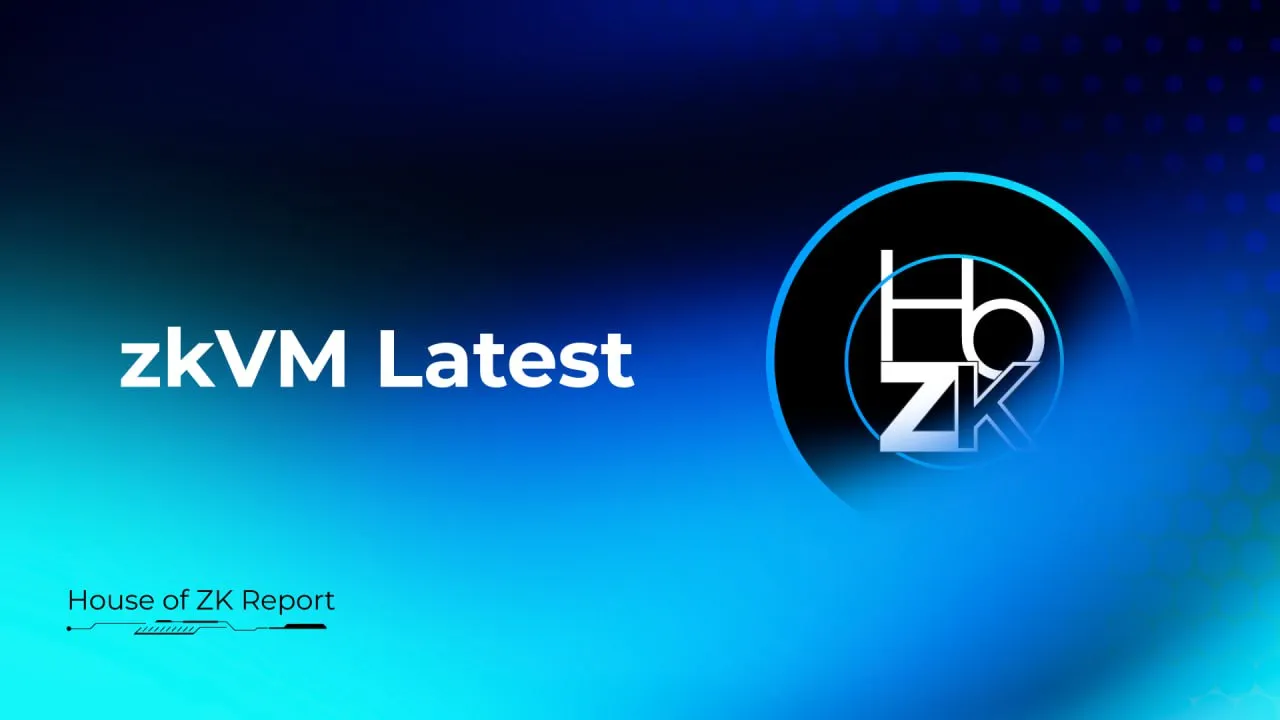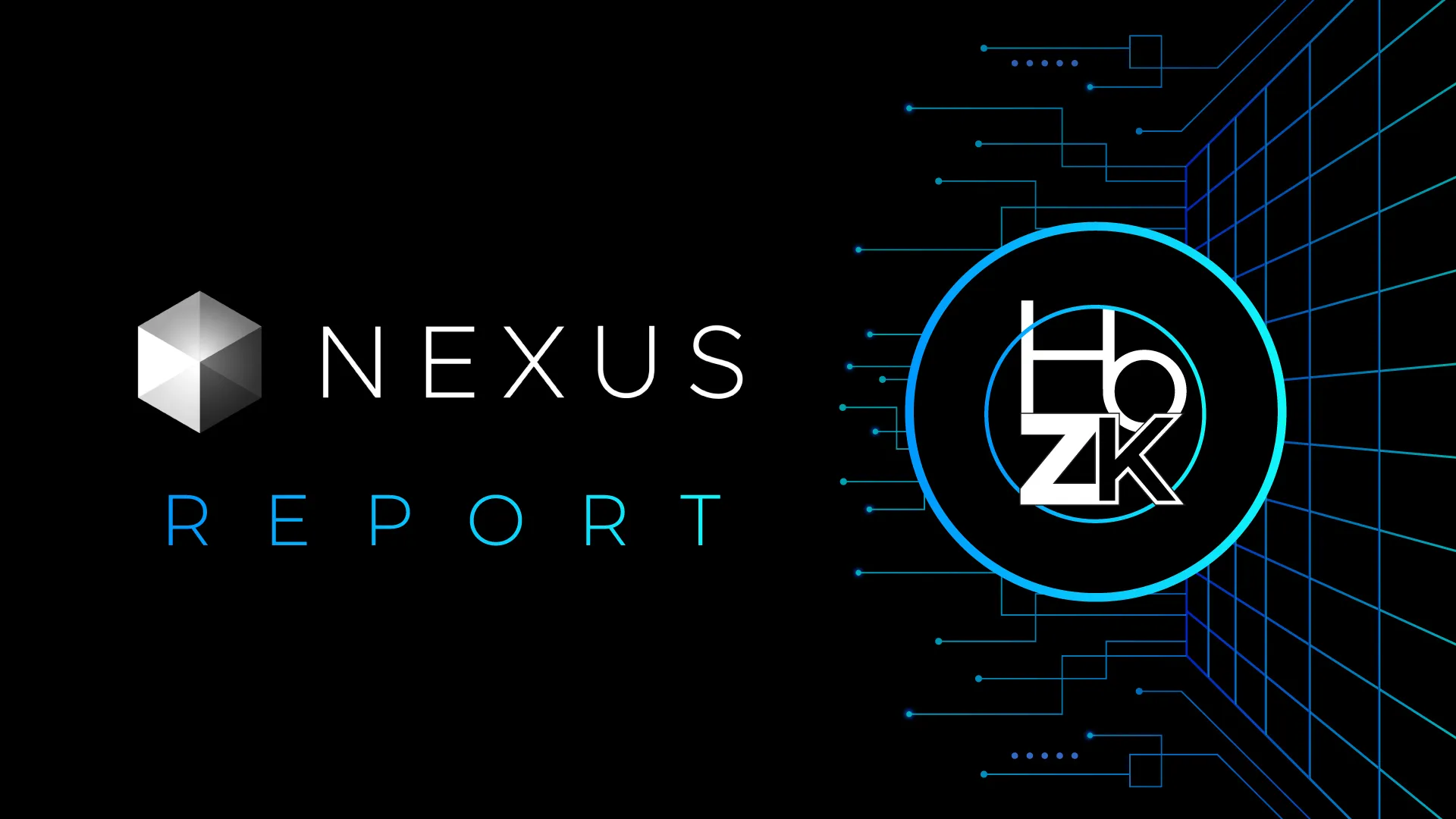
Here we report on the progress of the leading builders in the zkVM ecosystem, documenting recent significant releases, technical breakthroughs and general updates.
Featuring: @SuccinctLabs, @ProjectZKM, @NexusLabs, @RiscZero, @ziskvm, @openvm_org, & @0xMiden

Media
In a recent episode of @HouseofZK Radio, @pumatheuma, Co-founder of @SuccinctLabs, joined @alicelingl to discuss real-time proving on @ethereum using a decentralized prover network:https://x.com/HouseofZK/status/1960315843755016428
The conversation explored sub-12 second proofs, GPU-driven auctions, SP1 to HyperCube advances, verifiable UX via VAPs, @Bitcoin rollups, and the likelihood of only a few zkVMs being enshrined. Full podcast:https://hozk.io/radio#68-Uma-Roy-Co-founder-of-Succinct
Partnerships
Succinct has signed a one-year partnership with Tandem, the venture arm of @OffchainLabs, to develop ZK proving for @arbitrum chains: https://blog.succinct.xyz/arbitrum/
The deal highlights Succinct’s role in expanding the Succinct Prover Network, which already serves over 35 projects. By enabling ZK on Arbitrum, the collaboration could significantly increase proof demand of its network, broaden adoption across @ethereum scaling, and open new revenue opportunities for provers, stakers, and partner protocols.
Integrations
The project has integrated its Prover Network data with @Dune, giving users open access to analytics on the proving economy: https://x.com/SuccinctLabs/status/1960749307445018985
The network is already reducing proving costs, supporting its role as a coordination layer for the ZK ecosystem. Community-built dashboards highlight growing security and demonstrate the ecosystem’s active engagement.
Succinct has also integrated with @celestia’s Blobstream, @Galxe, and @AcrossProtocol. These protocols are now supported by the Succinct Prover Network, enabling efficient proof generation and lower costs: https://x.com/SuccinctLabs/status/1965460235134664904

@ProjectZKM shared its August monthly report, outlining major developments across technology and research:https://zkm.io/blog/the-zkm-august-update-2025
Highlights include:
Publications
The project has published multiple new articles focusing on different components of its ZK infrastructure:
The first covers the use of Multilinear Extensions (MLE) in the multivariate sumcheck protocol. It explains how point evaluation, addition, and multiplication work in both evaluation and coefficient forms, highlighting efficiency gains in zkSNARK computations: https://zkm.io/blog/multivariate-sumcheck-protocol-part-2
The second article explains how various constraints - such as zero checks, rational functions, permutation, and lookup arguments - can be reduced to the multivariate sumcheck protocol. It presents reduction techniques that are widely used in modern ZK systems like Plonk and Halo2: https://zkm.io/blog/multivariate-sumcheck-protocol-part-3
The third and final article outlines why ZKM builds its zkVM on the stable MIPS32r2 architecture. Like Bitcoin’s unchanging base layer, ZKM prioritizes constraint stability over rapid ISA changes, ensuring long-term auditability and performance consistency: https://zkm.io/blog/mips-as-a-bitcoin-like-base-for-proof-longevity
Media
In a recent episode of @HouseofZK Radio, @DacEconomy, Co-founder & Chief Scientist at ZKM, sat down with @alicelingl to discuss the evolution of ZK from @ethereum to Bitcoin: https://x.com/HouseofZK/status/1958529972680757594
They explored ZKM’s MIPS-based zkVM, Bitcoin L2 architectures like @GOATRollup, and how verifiable compute enables a secure, programmable Bitcoin economy - shifting BTC from passive store of value to an active application platform.
Full podcast: https://hozk.io/radio#67-Ming-Guo-Co-founder-Chief-Scientist-at-ZKM

Tech
@NexusLabs has published its latest changelog 8.29.25, introducing improvements across all core components:
https://blog.nexus.xyz/nexus-changelog-8-29-25/
Details include:
Partnerships
Nexus has partnered with @AvailProject to integrate its data availability layer into the Nexus L1 following mainnet launch: https://blog.nexus.xyz/avail-partnership/
Avail offers faster, cheaper, and horizontally scalable DA, cutting costs by 90% and speeding verification by 15×.
The project is also teaming up with @cyclenetwork_GO to strengthen the Web3 settlement layer:https://blog.nexus.xyz/cycle-network-partnership/
The partnership involves integrating Nexus into Cycle’s infrastructure, launching joint community campaigns, and exploring zkVM integration to enhance verifiability. With over 10 million users and strong security, Cycle adds scale and simplicity.

Ethproofs Call
In the recent @eth_proofs Call #4, @BruestleJeremy, CEO and Co-founder of @RiscZero, made the case for enshrining RISC-V at @ethereum's base layer. Timestamp: 00:16:10: https://youtube.com/watch?v=rJiEV7jJFl4&t=6892s
Jeremy explained why RISC Zero selected RISC-V for its zkVM, emphasizing its simplicity, strong ecosystem, and alignment with ZK needs. He highlighted how using a standard ISA accelerated industry adoption, enabled full Ethereum block proving early on, and opened paths for broader language and toolchain support within ZK environments.
Events
@boundless_xyz and @HouseofZK, in partnership with @googlecloud, will host Verifying Intelligence on Sep 29 during @token2049 week in Singapore.
The one-day event will focus on verifiable AI, including proof-carrying inference, accountable data pipelines, and privacy-preserving computation. Panels and keynotes will gather builders and policy leaders to define verification standards.
Sponsors include @VeridiseInc, @OntologyNetwork, @0G_labs, @LazAINetwork, @gonka_ai, and @alt_layer.
Registration: https://luma.com/ae6uqqvw

@ziskvm has released its version 0.11.0, adding macOS support and several technical improvements: https://x.com/ziskvm/status/1963503563293823187
The update includes optimizations for GPU and CPU transfers, virtual table integration, and recursive circuits migrated to PIL2. It also introduces statistics tracking, Rust verifier integration, and support for new instructions. Developers note that the software is still under active development, untested for production use, and may undergo breaking changes in future updates.
@eth_proofs announced that ZisK in-browser verification is now available on its platform, using an open-source verifier developed by the ZisK team: https://x.com/eth_proofs/status/1965122979219623949

@openvm_org has released version 1.4.0, introducing GPU proving, a redesigned execution system running at 150 MHz, and support for distributed proving across hundreds of GPUs:https://x.com/openvm_org/status/1962908415971451057
The update enables @ethereum mainnet block proving in 15 seconds for under $0.0003 per transaction on L40S GPUs, with further gains expected on upcoming 5090 GPUs. The release is dual-licensed under MIT/Apache 2.0 and audited by @cantinaxyz.

Media
Miden Co-founder @bobbinth joined @alicelingl and @pavel_sinel on House of ZK's recent 'Miden Special': https://x.com/HouseofZK/status/1965776884161192259
Bobbin explained his early journey into crypto, discussed his concerns with scalability and privacy in @Bitcoin and @ethereum, and how ZK proofs have opened a path forward. He also dived into the origins of MidenVM, elucidating on its shift into an independent project from @0xPolygon, and why Miden’s edge blockchain emphasizes client-side proving, privacy, and developer flexibility ahead of its planned Q1 mainnet launch.
Tech
@0xMiden has released Compiler v0.4.0, allowing developers to write a basic wallet and Pay-to-ID script in Rust and compile them fully into Miden Assembly for the first time: https://miden.xyz/resource/blog/compiler-release-04
The toolchain translates Rust code through WebAssembly and an intermediate layer before producing executable Miden packages.
While the release supports only part of the transaction kernel API, the next version will enable full Rust-based application development.